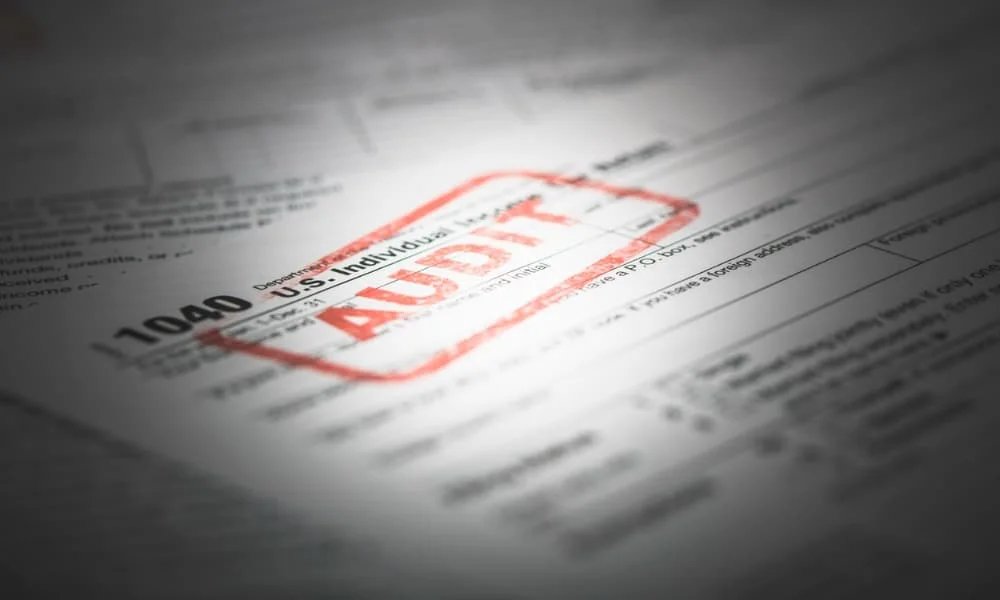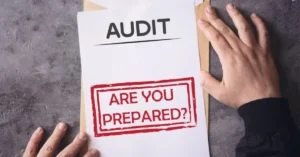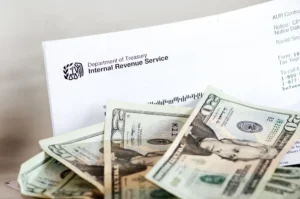Key Takeaways:
- Contractor audits happen when the IRS sees a potential issue with the tax return of a freelancer or self-employed individual
- The IRS will ask to review records to verify information
- Contractor audits may happen if the agency sees:
- High income or losses
- Large cash transactions
- Home office deductions
- High travel, meals, or entertainment expenses
- Reported income discrepancies
- Hobby business write-offs
- Profiling or random selection
- Ten steps to avoid or prepare for an audit:
- Be truthful about deductions
- Keep accurate records
- Set up a separate bank account
- Report all your income
- Understand deduction rules
- Use accounting software
- Keep up with new tax laws
- Review your tax return carefully
- Never lie to an auditor
- Work with a tax professional
- Common mistakes freelancers make during IRS audits include not responding in a timely manner, not having organized documents, and failing to file their tax return on time
Taxes can be complicated for the average American. Self-employed individuals have even more to navigate, from paying quarterly taxes to tracking expenses to claiming business tax breaks.
The prospect of an IRS audit can add even more stress to the equation, unfortunately. You may be worried you did something wrong and that you’ll have to pay a big penalty. The good news is that audits don’t happen to very many people. Only about 0.38% of tax returns were audited in 2022, for example. Self-employed people, however, may be targeted more than others because of their potential for underreporting income or overreporting deductions.
Audits may seem daunting, but it’s essential to understand the basics of why they happen and how they work to protect yourself and your business. This guide explores the fundamentals of IRS audits for contractors and how you can prepare yourself for a potential audit.
What Is a Con tractor Audit?
A contractor IRS audit takes place when the IRS examines a freelancer’s or self-employed individual’s tax returns and financial records. The primary goal of an IRS audit is to ensure the freelancer has reported their income and expenses accurately and that they have paid the appropriate amount of taxes.
It’s important to note that IRS audits can happen to anyone, regardless of how honest and meticulous you are with your tax filings. Random selection, inconsistencies in tax filings, and high deductions can trigger an audit, among other factors.
The IRS will review your tax returns and financial records during a contractor audit, including bank statements, receipts, and other documents that pertain to your income and expenses. The auditor will look for any inaccuracies or discrepancies that could impact the amount of taxes you owe.
The auditor may require you to provide additional documentation or explanations to resolve the issue should they find discrepancies. They may request an in-person meeting or require you to provide a written response to their findings. You could potentially owe back taxes, penalty fees, and interest charges if the audit results in any changes to your tax return.
Why the IRS May Audit a Contractor
Many factors can trigger an IRS audit. A few are more common for freelancers and contractors. Here are the top reasons why you may be facing an IRS audit as a self-employed individual:
High Income or Losses
The IRS may flag a tax return if you report a higher-than-average income or losses. The agency will want to confirm that the reported amounts are accurate and that you haven’t missed any deductions or overstated your expenses. Sole proprietors who report $100,000 or more tend to have a higher risk of an audit, and chances increase as income increases.
Large Cash Transactions
The IRS may also scrutinize transactions more carefully if a self-employed individual receives or pays out large amounts of cash (typically $10,000 or more). These transactions are often red flags for money laundering or tax evasion schemes.
Home Office Deductions
Self-employed contractors who work from home may take advantage of home office deductions to reduce their tax liability. These deductions can be complex and open to interpretation, however. The IRS may audit a tax return if it suspects a contractor has claimed an excessive or fraudulent home office deduction.
High Travel, Meals, or Entertainment Expenses
Freelancers who travel frequently for work may incur high expenses related to meals, transportation, and entertainment. The IRS may take a closer look at these expenses, however, to ensure they are legitimate business costs and not personal expenses that have been disguised as those for the business.
Reported Income Discrepancies
Self-employed people are responsible for reporting all income they receive from clients or customers, including income earned through side hustles or part-time gigs. The IRS has a system that matches tax returns to third-party reports of income, so if a contractor fails to report all their earnings, the IRS may flag their tax return for an audit.
Hobby Business Write-Offs
Your tax return may be flagged for an audit if what you claim is your business continues to have losses each year, never making any money. The IRS views such pursuits as hobbies rather than businesses, and hobby-related expenses can’t be used to offset your income.
Profiling or Random Selection
The IRS may sometimes audit a self-employed contractor based on profiling or random selection. Profiling can occur when the IRS targets a particular industry or business type for audit. Random selection happens when the IRS arbitrarily selects a tax return for audit without any specific trigger or reason.
You can avoid triggering an audit from the IRS in most cases. The chances of being randomly selected are pretty low. You still need to know why the IRS audits in the first place, however, and how you can prepare. A tax expert can help you understand your obligations.
Ten Steps to Avoid or Prepare for an IRS Audit
Being diligent and honest about your income, expenses, credits, and deductions is important so you never have to face an IRS audit. Here are 10 other steps you can take to avoid an audit or to prepare properly if you’re facing one:
1. Be Truthful About All Deductions
Some contractors try to reduce their taxable income by claiming a lot of deductions. Always make sure everything you claim is truthful and accurate. The IRS is on the lookout for high deductions.
2. Keep Accurate Records
Maintain detailed records of all your income and expenses, such as all invoices, receipts, payment receipts, and bank statements. This will make it a lot easier to prove what you included on your tax return, and the audit process will be much smoother and faster when you have everything organized.
3. Set Up a Separate Bank Account
Keep your business finances separate by setting up a different bank account for your business income and expenses. This helps you divvy everything up accurately, and there’s much less chance you’ll get personal expenses mixed up with your business expenses.
4. Report All Your Income
Make sure to report all your income, including cash payments and payments made outside of the U.S. The IRS will likely pursue an audit if it receives information from a third party that doesn’t match what you submitted on your tax return.
5. Understand Deduction Rules
Familiarize yourself with the deduction rules for your industry and keep accurate records of all your deductions. You should never claim a deduction you don’t qualify for, which can trigger an IRS audit.
6. Use Accounting Software
Try using accounting software like QuickBooks to keep track of your business finances. This can help you track your income and expenses automatically and keep all your financial information organized. Software also allows you to generate quick, accurate reports if you have to provide information to the IRS.
7. Keep Up With New Tax Laws
Stay up to date with any new tax laws or regulations that may impact your business and your tax breaks or obligations. Tax laws do change frequently, and failing to account for new legislation can lead to mistakes on your tax return.
8. Review Your Tax Return Carefully
A simple mistake on your return can sometimes lead to questions from the IRS. Make sure you’ve included up-to-date, accurate information on your paperwork before you submit your return. Double-check all your numbers. Review everything again if you’re contacted by the IRS about an audit to make sure you only included correct information.
9. Never Lie to an Auditor
It’s important to always be honest about your income, expenses, and situation when you’re going through an IRS audit. The auditor will ask you various questions and will want you to provide specific documents to verify information. Never try to lie to the IRS to lower your tax burden. It will usually backfire and lead to more penalties and fees.
10. Work With a Tax Professional
Remember that you never have to face a tax audit alone. Hire a tax expert who understands the audit process and all applicable tax laws. They’ll help you understand each step to take, the information to provide, and what comes next.
It’s essential to do what you can to avoid a contractor audit and prepare your records if the IRS contacts you. The best thing you can do is be open and transparent and respond to requests in a timely manner.
Common Mistakes Contractors Make in IRS Audits
Mistakes may lead to an IRS audit, like failing to report all your income, taking excessive deductions, or not separating personal and business expenses. It’s also easy to make mistakes during the audit process, however. Here are common pitfalls to avoid with contractor audits:
- Not having organized documents: Your audit may take much longer if you don’t have everything documented and organized. The auditor will want to see documents like receipts and statements, so make sure these are accessible and easy to understand.
- Not responding to the IRS: Contractors may get frustrated that the IRS wants to audit them and then take too long to respond to IRS notices or requests. This can give the impression of unpreparedness and lack of concern, leading to additional issues and missed deadlines. Respond right away and comply with any requests.
- Missing the tax-filing deadline: Always file your tax return on time to avoid future issues with the IRS. This means staying on top of estimated tax deadlines each quarter throughout the year.
- Misunderstanding what you qualify for: You may be ready and willing to comply with an IRS audit and have all your documentation ready. You’ll run into trouble, however, if you think you qualify for credits and deductions you can’t take. Thoroughly research eligibility requirements before trying to claim a tax break for your business.
Avoid these mistakes by talking to a tax attorney about your situation. You don’t want to have to deal with any further tax complications.
Contact Silver Tax Group With Questions
Managing your tax obligations as a contractor isn’t always easy. You may dread paying quarterly taxes and filing your tax return every April. Being diligent and open with the IRS about your income and expenses, however, will help you stay in good standing with the IRS. You can then rest assured that you did everything correctly if you’re facing an IRS audit.
Talk to the tax attorneys at Silver Tax Group when the IRS contacts you about a contractor audit. We will help you through the entire process, ensuring you’re doing everything the right way. Reach out to Silver Tax Group to speak to a tax expert about IRS audits for self-employed individuals.





